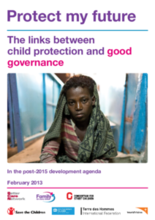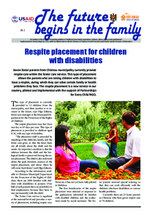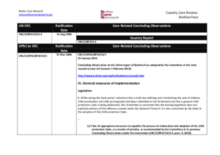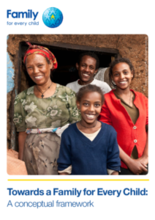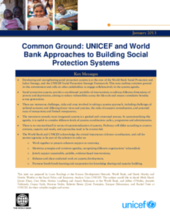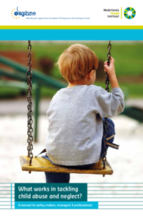Displaying 681 - 690 of 946
This paper is part of an inter-agency series on the links between child protection and major development goals. The report focuses on the links between child protection and good governance as they relate to the post-2015 Millennium Development Goals development agenda.
This 10-page newsletter, translated into English, is issue number two of a series produced by the “Protecting children of Moldova from family separation, violence, abuse, neglect and exploitation” project, which is implemented by Partnerships for Every Child, the Ministry of Labour, Social Protection and Family of Moldova, and the Ministry of Education of Moldova.
Care related Concluding Observations adopted by the Committee on the Rights of the Child on the initial report of Burkina Faso under the Optional Protocol to the Convention on the Rights of the Child on the sale of children, child prostitution and child pornography.
The article reviews the historical development of out-of-home care in Italy and Spain and compares foster family and residential care, as well as the main research contributions to these topics in both countries.
This book focuses on the lives of six mothers who had been pariahs and then became partners with child welfare commissioners, social workers, lawyers, foundation officers, and child welfare agency executives. It recounts how their courage and resilience brought about the most significant changes in the history of New York’s child welfare system.
This article focuses on the structural similarities and dissimilarities that exist between child protection systems in France and Switzerland, as exemplified by the evolutions of the last decade.
This document provides a conceptual framework for Family for Every Child, a global network of national civil society organisations working to mobilise knowledge, skills and resources to build a world where every child grows up in a permanent, safe and caring family, and to provide quality alternative care where needed.
This brief outlines the common ground between the World Bank and UNICEF in their commitment in developing and strengthening social protection systems and calls on other stakeholders to engage collaboratively to build such systems and expand their coverage.
This manual is the main outcome of the European Commission Daphne III programme, Prevent and Combat Child Abuse: What works? Involving regional exchanges and research from five countries (Germany, Hungary, Portugal, Sweden and the Netherlands), this manual brings together knowledge on what works in tackling child abuse. The manual suggests evidence and practice-based prevention and response strategies against child abuse and neglect, including programs and services that have been shown to be successful in strengthening family care.
This article provides an outline of the early development of care and protection in Australia and New Zealand as a backdrop to an overview of child protection systems and policies and the current child protection profile in both countries. An overview of trends in relation to out of home care, including routes into care, care arrangements and permanency policies is provided.

